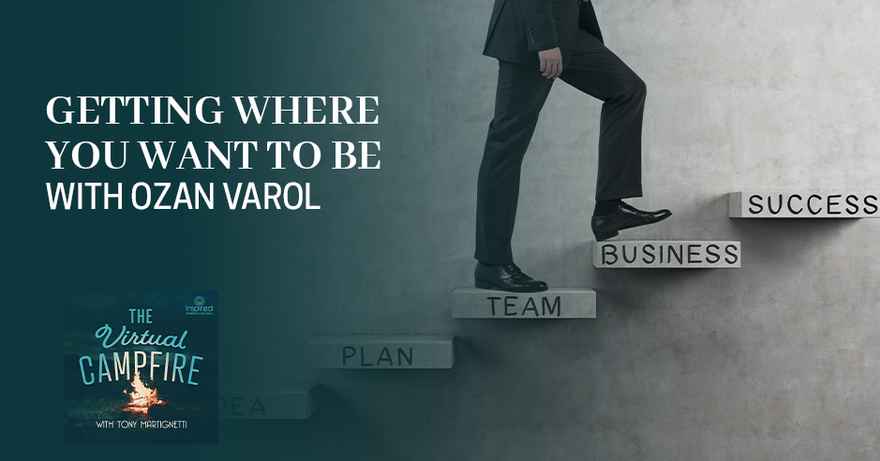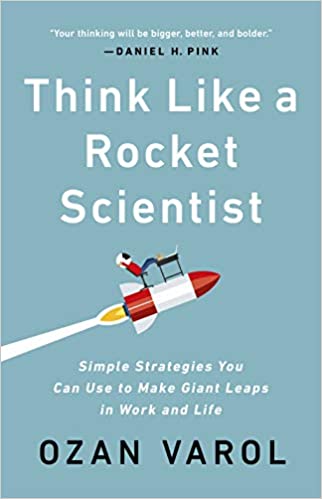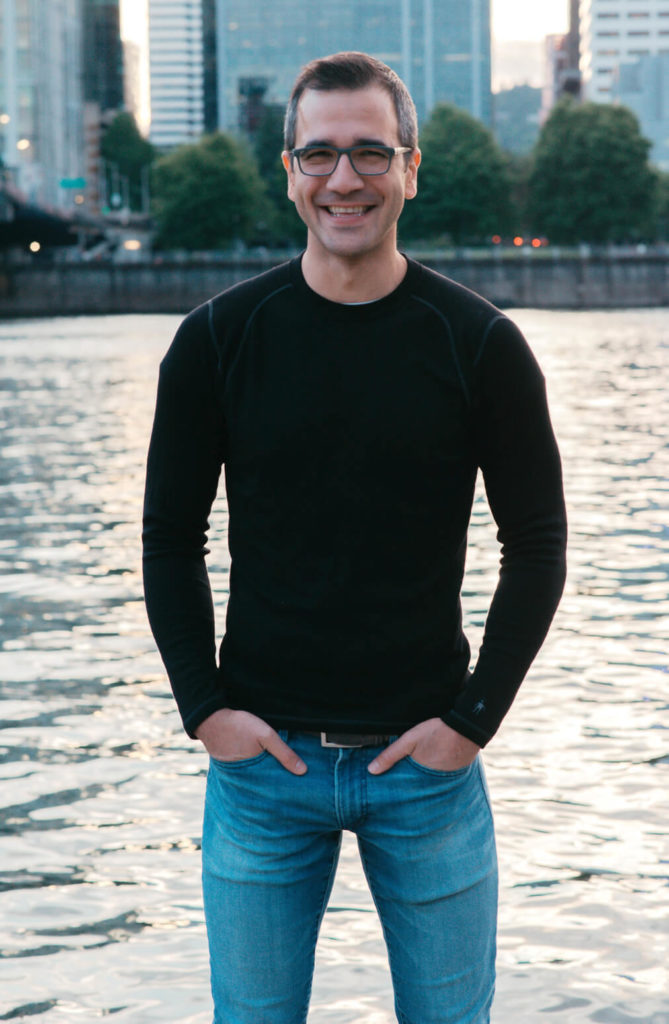Getting Where You Want To Be With Ozan Varol

Most of the time, we search for happiness in all the wrong places, and when we get there, we want to acquire more in life to believe that we have achieved success. Tony Martignetti talks with Ozan Varol about making the small moments count, making pivots when needed, and getting where you really want to be. Ozan is a former rocket scientist, turned award-winning professor, successful blogger, and the author of the number one bestselling book, Think Like a Rocket Scientist. In this episode, he shares crucial childhood experiences growing up in Turkey that shaped his interest in astronomy and his transition from being a professor to his very successful writing, blogging and podcasting career. He discusses how he overcame a huge language barrier in the US to work on the Mars Exploration Rover project. He also tells us of the book and poems that had a huge impact on his life.
---
Listen to the podcast here:
Getting Where You Want To Be With Ozan Varol
It is my honor to introduce you to my guest, Ozan Varol. He is a rocket scientist turned award-winning professor, number one best-selling author and thought leader. He is one of the world's foremost experts in creativity, innovation and critical thinking. Ozan has been called a true original by Adam Grant and dubbed a superhero by Dan Pink. His work has been described as a must-read by Susan Cain and featured in the Wall Street Journal, Time, BBC, CNN, Washington Post and more. He is a native of Istanbul, Turkey. Ozan grew up in a family of no English speakers. He learned English as a second language and moved to the United States by himself at seventeen to attend Cornell University and major in Astrophysics. Ozan, I want to welcome you to the show.
Thank you so much for having me on, Tony. It's a delight to be here.
I am so thrilled to have you here and to know the story that brought you to who you are now. I like to think of you as the polymath. I'm looking forward to knowing your story. The way we're going to this is we talk about what's called flashpoints in your story, the moments in your life that have added your gifts to the world. You'll be given the time to share what you're called to share. We'll pause along the way to see what's coming up, to give you a chance to see what themes and reflections we want to hone in on. With that, take over.
The first flashpoint that I can think of dates back to when I was 3 or 4 years old. I was living in Istanbul. We have this small apartment. At that time, it was a developing country so we get blackouts all the time. These would terrify me as a little boy. My dad came up with a game to entertain me. I had my soccer ball which like every boy growing up in Turkey has. He grabbed my soccer ball, light a candle and to distract me from the fear of the blackout, he would rotate the soccer ball around the candle to show me how the Earth rotated around the sun. That not only ended up reducing the fear I had associated with the blackout but it also fascinated me. It opened my eyes to this whole different world that I didn't know existed and I was hooked.
That was a flashpoint in the sense that those became my very first Astrophysics lesson and my interest only built up from there. I bought every Science book I could afford. I lost myself in the worlds that have been created by Isaac Asimov, Ray Banbury, and Arthur C. Clarke. Before Neil deGrasse Tyson was doing Cosmos and Carl Sagan had the original Cosmos series, I would watch those on old Betamax tapes. I had no idea what he was saying because I didn't speak English but I sat there and listened to him anyway. Those early Astronomy lessons from my dad which are so simple planted a seed in me that over time blossomed into me majoring in Astrophysics in college, serving on the operations team for the Mars Exploration Rovers Project, and then writing Think Like a Rocket Scientist.
It's funny how you worked on the Mars Rover Project and you glossed over it like no big deal. It's an amazing story when you think about coming to this country at seventeen years old, and your command of the English language is basically nonexistent at that point. That's scary on its own and it takes a lot of courage to go through that step. You had to have some massive amounts of courage but also a passion for what you were getting yourself into. Did you have a plan B? What would happen if all went not well?
Waiting way too long to get started and having excuses will not get you anywhere.
I did not have a plan B. A lot of credit goes to my parents here. They instilled in me a sense of autonomy from a very early age. One example that's emblematic of the way they raised me is when I was about to go into kindergarten. The way that the system works in Istanbul is you've got maybe 4 or 5 kindergartens within driving distance of your house. You can pick anyone you want and then you get enrolled there. My parents did some work on their own. They researched these schools. They went and visited them. They came home to me and said, "You are now going to start kindergarten and you've got three choices. We're going to take you to them and you get to pick which one you want. Think through what questions do you want to ask? What do you find important?" I'm 4 or 5 years old little boy and it gives me so much autonomy. Any one of these three kindergartens would work well for them. Having set up those guard rails and allowing me to walk into these schools, I felt like an adult.
I would go in and ask them the questions that I found important like, “What kind of toys do you have? What kind of books do you have? Do you have science fiction books?” All of the things that I found important at that age left a lasting mark. The poem Invictus comes to mind, “I am the master of my fate. I am the captain of my soul.” That idea was instilled in me by my parents at a very young age. Regardless of the circumstances we were in, economic and otherwise, the possibilities in life are limitless. If you want something, it's up to you to go and get it. That lesson stayed with me to this day.
That's something that everyone needs to know. You have to go get what you want and don't let anything hold you back from reaching out for that thing even though sometimes, there are many people in your path who say, “That's not possible. You can't do that.” I've started getting into the practice of saying, “What's holding me back? What is truly in the way? What's the obstacle that I can overcome to get there?”
Often the obstacle tends to be, at least in my experience, the story that we tell ourselves. That story doesn't necessarily come internally. It's a story that we were told to believe in by societal conditioning or by conditioning from our parents or education system, which plays a huge role in curbing our autonomy which we can talk about, and seducing a sense of believing that smaller dreams are wiser than moonshots. When you combine those three factors, society, family and the education system together, you end up with limiting beliefs that stay with you for a very long time, and identifying those beliefs and knowing how to manage them is important.
I had gotten into Cornell. I was still in Turkey and a few weeks before I arrived on campus, I’m still in Istanbul. I was researching what the Astrophysics Department was up to. I’ve learned that one of the professors in the Astrophysics Department was in charge of a NASA-led mission to Mars. He was the principal investigator for what would later be called the Mars Exploration Rovers Project. There was no job listing but I thought to myself, “I'm going to email him to see if I could get a job working on this Mars mission, if there is any room for me to work on it.” I had taught myself how to code in high school. I remember drafting that email expressing my burning desire to work for him, attaching my CV. When I was about to hit send, this voice that we all know and we're all familiar with, the voice of inner critic of "You can't do this" came into my head.
 In my case, it was the voice of, “You're a skinny kid with a funny name from a country halfway around the globe. What could you possibly contribute? There is no job listing. Why are you even sending an email to this important person?” That voice hasn't completely disappeared. It still comes up from time to time. I asked myself two questions. The first one is, “What is the worst that can happen? What would I do if that worst thing were to actually happen?” In that case, the worst thing that would happen is he’d never write back to me. He'd ignore it, think I was out of my mind, and that would be that. I would never hear from him again.
In my case, it was the voice of, “You're a skinny kid with a funny name from a country halfway around the globe. What could you possibly contribute? There is no job listing. Why are you even sending an email to this important person?” That voice hasn't completely disappeared. It still comes up from time to time. I asked myself two questions. The first one is, “What is the worst that can happen? What would I do if that worst thing were to actually happen?” In that case, the worst thing that would happen is he’d never write back to me. He'd ignore it, think I was out of my mind, and that would be that. I would never hear from him again.
I then asked myself, “What is the best that can happen?” The best that can happen is I would land a “pinch me now” job working on the operations team for this Mars mission. When you put it that way, then the choice is so obvious. I clicked send and I'm so glad I did because mustering up the courage to send that email trigger the series of events that led to me writing Think Like a Rocket Scientist and publishing that book. I still use those two questions on a regular basis. Whenever I'm afraid of taking a leap into the unknown, I ask myself, “What's the worst that can happen?” It's a little bit more nuanced than that now, “What's the worst thing that can happen? How likely is that thing to actually happen?” Usually, our worst-case scenarios are highly unlikely. If that were to happen, what would I do? What's the best that can happen? Our minds are good at generating horrible scenarios. It's very nice in my view and important to counterbalance that with, “What is the best that can happen?”
There's an element of that negative bias that we all have. We always imagine the doomsday. Hopefully, you don't get yourself stuck in that mode when you're imagining the worst that can happen.
To make sure you don't get stuck in that mode is to write down your answers. I find that hypothetically thinking about worst-case scenarios can end up making them worse, but something about writing them down has a way of disempowering them. When you see your fears with the masks off, having written them down, I often find that the feeling of that fear is worse than the thing I fear. Writing them down is a nice way of dressing down your fears and seeing them with their masks off.
I have this thing called the worry list that I write down and it has the same feel to it. It's like writing down the worries, gets them out of my head and onto paper. It disempowers them. It comes from the same place. I want to shift gears a little bit. You've already known about moonshots at that moment. When you click send, that was your moonshot. Where did you go from there? You had a career that even surpassed this time working on the Mars Rover.
I worked on the Mars Exploration Rovers Project for four years and then I switched gears. I did a 180 and ended up going to law school. I practiced law for two years and then I ended up transitioning. I've had so many pivots of my life. I had transitioned to teaching law. I did that for several years. 2021 will be my last one as a law professor because I did another pivot. I started making the pivot back in 2016 when I launched my blog and podcast. My moonshot then was to write a mainstream book that would help people make giant leaps in their lives. Even when I was young, I was applying some of these strategies. I didn't call them moonshot thinking or backcasting. Backcasting is something I use on a regular basis where instead of forecasting which is looking at your budget resources skillsets, and then extrapolating them into the future, which can be problematic because often the status quo is part of the problem.
With forecasting, you're taking the status quo and projecting it out into the future. All of your problematic assumptions and biases get compounded. With backcasting, you work backward from the desired outcome. In my case, back in 2016, writing a mainstream book for a lay audience was my moonshot and I work backward from that. Working back from, what do you need to be able to publish a book with a major publisher? You need an agent. How do you get an agent? You need a referral from somebody who already knows and has worked with that agent. You need the big platform, ideally, people who are already reading what you're writing. That led to me working back from that desired outcome. It led me to launching a blog in 2016 and a year later, I followed up with a podcast. Those decisions eventually got me an agent, and then led to the publication of Think Like a Rocket Scientist.
You have to have massive amounts of courage and passion for what you were getting yourself into.
For anyone who’s reading, they have to go check out Ozan’s blog, book and podcast. They are all fantastic. For starters, the blog was something that hooked me initially, just amazing insights. It’s interesting to know, here you are, you had a plan, this backcasting which is powerful. It started a while back and things have fallen into place. where have you stumbled? Had there been any places where you've had to stop, shift gears and change things around?
I think, so many of these. I had a hard time initially growing my following and having read many articles online when I was starting out. I made a couple of mistakes. The first major mistake I made was waiting way too long to get started. I thought I had the idea of doing something like this for years and I didn't do it until 2016. That was mistake number one. The reason why I waited was that I was telling myself this story that serious law professors don't blog for the general public. I'm supposed to be writing serious academic articles that only ten people in my subspecialty field of Comparative Constitutional Law read. “Serious law professors don't do this,” I kept telling myself that story and that was reinforced by the people around me. They were like, “Don't do that.” I would broach that idea and the unanimous response was like, “No, put your head down and keep writing academic articles.” I waited way too long to get started.
Looking back on it now, I easily could have started earlier. Even after I started, I remember getting a call from one of my close friends in academia. She said, “You are risking your scholarly significance. People are going to look at your website and laugh at you. You're going to ruin all chances you've got of moving to a different law school, a different city. You're going to get stuck where you are because people are not going to take you seriously in academia.” That hurt because she was coming from a very good place. She was trying to look out for me but the message was like, “Don't do this.”
There's a poem I love from Dawna Markova called I Will Not Die an Unlived Life. This is a stanza that I've memorized, “I choose to risk my significance so that what comes to me as seed can move on as blossom, and what comes to me as blossom can go on as fruit.” Particularly the line, “I choose to risk my significance,” whenever I'm afraid of taking a leap now, that line comes to me as echoes from my subconscious, reminding me that I've got nothing to lose. It’s telling myself, “I am willing to risk my significance as a law professor.” If I hadn't done that, I wouldn't be here right now. I wouldn't have a blog, a podcast and a book. I find that to be powerful. That was mistake number one and that was a major mistake but such an important lesson learned.

A couple of minor mistakes along the way was when I first started, I end up with such inflated expectations about what my growth is going to look like because there are so many articles online like, “Get 10,000 email subscribers in six months.” That gives you this ridiculous expectation. It's someone who supposedly did this before, and then they teach you how to do it. They charge you a bunch of money for it. Having gone through some of that, I was expecting to hit such high numbers early on. At the end of year one, I had maybe 600 subscribers to my email list which at the time felt like a failure. Chasing that particular outcome was hurting the quality of my writing because I was trying to prime articles for the right SEO. I was trying to write articles that were going to resonate with the masses, which completely detracted from the quality of my writing.
Abandoning that as the desired outcome of trying to get as many thousands of followers and going back to try to do what I do best, which is going in and sharing insights that I find to be valuable without regard to SEO or whether or not they're tweetable or not. That was the key that eventually unlocked whatever success I've had with my platform. That has been taking the focus off of the outcome and focusing on the process because honestly, the process is what matters. If you can find something where the process is play, then you'll be able to build that amazing life. That's what I was able to do with my writing.
There's something about unleashing your creativity by allowing yourself to be free and not be held back. I was thinking about this concept that comes up a lot for me and for a lot of people, especially in this day and age, around people who are stuck in boxes or being labeled and categorized. It's challenging because that's why often you hear people say, “You can't do that. You shouldn't do this.” They see only through the lens that they are used to seeing the world through. That's why they hold people back. As soon as you can start to say to yourself, “I don't want to be seen that way. I'm okay if I break free from that.” As soon as you get that freedom, it is amazing. You're proof of that. That story is proof that when you set yourself free, the possibilities are endless.
It is true, but don't get me wrong. It's so hard to do. This is why it took me so long. Your ego gets in the way because your ego is the part of you that's attached to the accolades and to the titles. That kicks and screams the moment you say, “I'm going to leave behind. I'm going to shed my old skin the way a snake does and put on this new skin.” I made the decision to make my final year in academia as a law professor. Leading up to that decision, my ego is still sometimes will come up and say, “You're making the worst call of your life. You have a future-proof career. You have tenure. That's a guaranteed paycheck and safety net for life. Why would you ever give that up? What are you going to do? More importantly, who are you going to b? People have been calling you Professor Varol now for years. Who are you going to be without that title?” That can be a hard question to answer.
I've made so many of these pivots that I know what's on the other side is going to be exciting. I've been preparing myself for this moment for a few years, experimenting with different ideas and waiting for them to bear some fruit before I take the leap. Even with that, I was still telling the story to myself that, “Academia is a safety net for me. I don't think I'll ever give that up.” You look at it one day and realize the safety net is actually a straitjacket because it allows you to only play in this one safe area. As you said, to box yourself into that area because you don't have a safety net anywhere else. You're only going to play in this one area. You can do all sorts of moves there.
Safety nets are important, don't get me wrong. Over time, you outgrow them, and even if you outgrow them, they have a way of confining you, which is the point when the safety net turns into a straitjacket. At that time, you got to take it off because if you don't take it off, then you're going to be confined and boxed and you will die an unlived life, from the title of the poem from Dawna Markova. That realization and a lot of thinking and experimenting are what finally led me to take the leap and say, “I'm having so much fun writing for mainstream audiences, running my membership community, running this mastermind that my wife, Cathy and I started, and doing popular speaking. I want to do all of that full-time without the demands of the academic world.”
That poem is so powerful. It's one of my favorites too. You introduced me to it so thank you. There's always the push and the pull around things that are meant for you are always hard because there's always something that's pulling you back into your prior life. That's how I define growth in many ways. It's hard because there's an urge to stay where you are. There's also an urge that pulls you in the direction to take the next leap. If there wasn't a pull, then I don't think it would be the right thing for you.
I have found that the universe has a way of setting up walls to separate those who want something from those who don't. Whatever I've come close to achieving something, there's always some roadblock towards the end. It's almost like this test of, “Do you really want this?” If you want it, you can go over that roadblock and figure out a way around it. If you don't want it, then you can give up. That reminder is also for me a good one to say, "This is a roadblock." This happened with the launch of my book. I worked on the book for a long time and it was published on April 14, 2020, at the height of the pandemic. A month before the book comes out, the whole world shuts down. My book tour was canceled. I spent a couple of days being miserable and thinking all of my efforts are going to go to waste. I also spent a lot of time wishing for reality to be different than what it was, for the universe to deal me a better hand, then it's like, “No.” That's a futile exercise trying to control what can't be controlled.
If you can turn within and ask yourself, “I cannot change the hand that the universe dealt me but how can I play the hands that do that? What is mine to shape here?” That's a much more fruitful question to ask. Asking that question led me to come up with creative ways of getting the word out about the book virtually like doing book launch events with other authors who are in a similar position as I was, and that changed everything. At that moment, I could just have said, “My plans have been scuttled. There was nothing I could do,” or there's a much better way of approaching it which I finally did after I crawled out of my canyon of despair which is to ask like, “What can I do with the hand? How can I use my skills and resources in a way that I haven't used them before to solve the problems that need solving right now, as opposed to the problems that I wanted and expected to solve?” That's a much more productive way of looking at the world.

Thinking about the launch of your book, it came at the perfect time for your book. The ideas in the book are perfectly timed for the time we live in because of the fact that people need to think about what is on the other side of this. From that perspective, your book is needed because it gives the right ideas for people to get on the other side of this.
Thank you for that, Tony. It's so hard when you're in the moment of like, “My book tour is gone.” It’s hard to see that. I totally missed that. The first chapter of the book is called Flying in the Face of Uncertainty. It's relevant to this world but when you're in the moment it's hard to see that. Some things reveal themselves only in hindsight. When you muster up the courage to zoom out and ask the right questions as opposed to the unproductive ones that feel like you're tugging at a flower to make it grow faster, that's a useless exercise.
There are so many places we could go into in terms of your story. I'd like to take a moment and see what's coming up for you around the big lessons that you've taken away from your journey to getting to where you are now. I know you've shared a lot already but maybe it has to do with what you would have told yourself ten years ago.
In addition to some of the lessons we've covered already, one other lesson that keeps presenting itself is success won't make you happy. That is a lesson that I'm still learning and relearning because my entire life I've been so achievement-oriented. Initially, it was coming to the US, working on the Mars Rovers Project, and then getting into a great law school and federal clerkship. It was like one mountain after the next. I always thought that happiness was on the other side. Happiness will come once I reached the top of that mountain. Of course, it doesn't. Once you reach the top of one mountain, you look for others to conquer and you keep telling yourself, “I'm going to postpone happiness and the life that I want to create for myself until after this momentous occasion.” That is untrue. Happiness for me lies in those small moments. If you're not happy before success comes, you're not going to be happy after it.
Happiness lies in the small moments because if you're not happy before success comes, you're not going to be happy after it.
That is a lesson that keeps coming up for me. Especially over the past 1 or 2 years, as a result of a number of experiences I had in childhood, joy was always a foreboding emotion for me. When I saw joy, I would almost run away from it. It's taken a lot of reconditioning for me to when I see joy now, even small moments of joy like taking ten minutes to sit outside with my wife, Cathy, and have coffee while watching our two dogs play. It’s incredible, and reminding myself that life happens in those small moments. They're not going to happen when my book is published or when this or that happens.
The high that comes from success lasts for the briefest of moments. It's all about the path, process, journey and retraining my brain to recognize those small moments of joy and lean into them, like lead into them. Kurt Vonnegut had a way of saying like when they're sitting underneath a tree and drinking lemonade, his uncle would say, “If this isn’t nice, I don't know what is.” That's a phrase I repeat often too, capture those moments of joy and tell myself like, “If this isn't nice, I don't know what it is.” That is a lesson that has kept presenting itself. I’m still trying to learn getting better at it but definitely a work in progress.
It's probably the most powerful lesson amongst all the lessons that people can take away. Especially in the light of the outward achievement that people see in you and other people, they’re like, “Look at that success.” If you don't have that inner peace and feeling of happiness, I get that. I feel that element of you have to find that happiness for yourself in those little moments. It's funny, you mentioned about the mountain. The book I'm writing is called Are You Climbing the Right Mountain? It's about that, especially people climbing to the top of this mountain and then finding they didn't climb the right mountain or it wasn't worth the climb because they've sacrificed so much to get there. The way you describe it is right in line with that feeling of, “Am I feeling fulfilled or happy about the way that I've climbed the mountain?”
Are you getting joy out of the climb itself or are you climbing somebody else's mountain? It's so easy to do when we're surrounded by so much noise and we always compare ourselves to other people. We think that climbing somebody else's mountain is going to make us happy and it doesn't.
I can't thank you enough for all the insights. Let me switch gears to one last question and that is, what is one book that has had an impact on your life?

I was reading this book in 2012 and I was a baby law professor at the time at a conference for law professors. There's a lot of networking that goes on at these events just like any other industry event. I am a deep introvert. Networking and small talk suck my soul. They drain the life out of me. I would run up to my hotel room to take breaks. I would read a few pages from this book. The book was Susan Cain's Quiet: The Power of Introverts in a World that Can’t Stop Talking. The book resonated with me in such a deep way because it verbalized something that I felt my whole life. Beyond that, it also planted a seed in me. When I had Susan on my podcast, I told her this too. It planted a seed in me. Reading that book was such a powerful experience. I thought to myself, “I'd love to do this someday for somebody else.” I love to write a book that somebody else will read and walk away from with the same feelings that I did with respect to Quiet. That seed, eight years later, blossomed into Think Like a Rocket Scientist.
I wouldn't classify myself as an introvert but I read it because I had this feeling that it was going to resonate with me and it did. It was such a powerful thing. I feel like I have a good understanding of people in general because of the way she wrote the book. Ozan, I don't even know where to begin. This has been full of so many great insights and stories. I feel like we could go for hours. Thank you so much for coming on. I also want to make sure you can give a chance to share where people can find you. They should go buy your book immediately, Think Like a Rocket Scientist, but where can they find you?
The best place to keep in touch with me is through my email list. You can sign up for that at WeeklyContrarian.com. Send an email. That goes out every Thursday morning and share one big idea that you can read in three minutes or less.
Thank you so much for coming on. I also want to thank the readers for coming on the journey with us and leading with some amazing insights.
Thank you so much, Tony. It’s always such a pleasure chatting with you.
Important Links:
- Ozan Varol
- Think Like a Rocket Scientist
- Blog– Famous Failures
- Podcast– Famous Failures
- Quiet: The Power of Introverts in a World that Can’t Stop Talking
- Susan Cain – Famous Failures Podcast episode
- WeeklyContrarian.com


 Ozan Varol is a former rocket scientist, turned award-winning professor, successful blogger, and the author of the number one best selling book Think Like a Rocket Scientist. His interest in science was piqued as a child, and he then worked in academia for many years. His work has been described as a ‘must-read’ by best selling author Susan Cain.
Ozan Varol is a former rocket scientist, turned award-winning professor, successful blogger, and the author of the number one best selling book Think Like a Rocket Scientist. His interest in science was piqued as a child, and he then worked in academia for many years. His work has been described as a ‘must-read’ by best selling author Susan Cain.
0 comments
Leave a comment
Please log in or register to post a comment